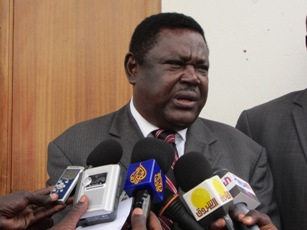South Sudan’s interior minister calls for responsible journalism, as acts against the press continue
October 25, 2011 (JUBA) – South Sudan’s minister of internal affairs, General Alison Manani Magaya asked members of the country’s media on Tuesday to carry out “responsible” reporting in the aftermath of various acts against the press by the new country’s security services.

Oliver Modi, the chairman of the Union of Journalists of Southern Sudan, told the Committee to Protect Journalists last month that there have been eight attacks against the press in South Sudan in 2011.
CPJ’s report says that ‘local journalists fear the former rebels turned government officials still harbor a war mentality that is unaccustomed to criticism, and that they are not prepared to extend the freedoms they fought hard to attain.’
The interior minister tried to allay such concerns by describing the media as “partners in development,” but asked journalists to work “thoughtfully,” to follow professional standards and the constitution.
However, the freedom and independence of media industry is not clearly stated in the transitional constitution, which came into being on 9 July, when the Sudan People’s Liberation Movement (SPLM) became the ruling party of South Sudan as an independent country, having governed the region since a 2005 peace deal.
The minister warned that, “This is a very crucial period; it is a period when you have international community watching the new country embark on nation building.”
Human rights activists and some academics say the lack of clear legislation is hindering the development and performance of the media in South Sudan.
Minister Magaya told the journalists to be “mindful” of bribes and people seeking undue influence over the media.
He urged journalists to put South Sudan’s interests ahead of personal, institutional or political gain.
The minister advised, “whatever you write must be only facts and nothing more. You need show loyalty to your country and not parties or individuals. Parties come and go but a country remains for generations.”
The minister reminded the journalists of their roles in the society, urging them to be aware of the fact that the media plays a very important role in the maintenance of peace and security and the international image of South Sudan.
There have been many acts against press freedom this year and since South Sudan’s independence in July. Last month the editor in chief of The Citizen newspaper, Nhial Bol, was arrested and briefly held by police before being released without charge following his newspaper’s investigation into the business dealings of a Warrap state minister.
Earlier this year Bol was taken into custody and had a gun pointed in his face by a police officer in Juba, who said his writing had “spoiled” the image of South Sudan’s SPLM dominated government.
Magaya, however, said that the media and the government are partners in development and should not see each other as as rivals or competitors.
“Whatever you write always […] think of South Sudan first, read your report and then ask yourself if this goes out does it have any implications on me as an individual, the country or the individual I am writing about? Once you are able to decide this, then you go ahead.”
PEACE AND SECURITY
The interior minister also underscored that the maintenance of peace and security is a collective responsibility of all South Sudanese, stressing that there cannot be any meaningful development without peace and security.
“There cannot be any sustainable development without peace and security. What you are able to achieve in 100 years can be destroyed within an hour. So meaning each and every one of us has a collective responsibility and in order to play your part or to contribute your quota, we must forget about our individual interest and think of South Sudan first,” he further stated.
(ST)
